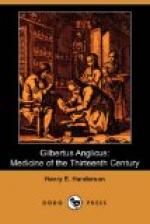In travel by sea, Gilbert tells us the four chief indications are to prevent nausea, to allay vomiting, to palliate the foul odor of the ship and to quiet thirst.
For the prevention of nausea he recommends the juice of acid pomegranates, lemons, etc., or a decoction of parsley or sweet cicely (cerfolium). The traveler should endeavor to sit with his head erect, should avoid looking around, but maintain his head as immovable as possible, and support himself by a firm grasp upon some beam of the ship. Some sweets may be sucked, or he may chew a few aromatic seeds. If vomiting ensues, acid or sweet pomegranates, figs or barley-sugar (penides) may be taken sparingly, but no food should be ingested until the stomach is thoroughly quieted. Then the patient may take a little stomatichon or dyantos, and a small portion of digestible food. As the diet must necessarily consist largely of salty food and vegetables, these should be cooked in three or four different waters, and then soaked in fresh water. A little aromatic wine will also benefit the patient, and a few aromatic seeds chewed in the morning are also of service.
The effect of the foul odors of the ship may be combatted by the use of aromatic electuaries, “which comfort the heart, the brain and the stomach.” The patient should be removed to some quiet portion of the ship, as distant as possible from the channels for the discharge of the bilge-water, and short walks upon the upper deck will contribute to convalescence. Frequent changes of clothing will palliate the annoyance of fleas and pediculi. Drinking water may be purified by aeration, or by straining, boiling and subsequent sedimentation and removal of the sediment by filtration through fresh and clean sand. For the wealthy, the water may be distilled in an alembic, if such an apparatus is obtainable. Avicenna says that bad water may be corrected by the addition of vinegar. Exposure to the midday sun and to the nocturnal cold, constipation and diarrhoea should be avoided, and prompt attention should be given to all disorders of the health.
To these wise counsels Gilbert courteously adds a medieval bon voyage in these words:
“Dominus autem omnia dirigat in tranquilitate. Amen.”
It has been already remarked upon a preceding page that Gilbert of England was not a surgeon. Nevertheless it is only fair to say that the surgical chapters of the Compendium present a more scientific and complete view of surgical art, as then known, than any contemporaneous writings of the Christian West, outside of Italy.
It is well known that during the Middle Ages the practice of surgery in western Europe was generally regarded as disreputable, and operative surgery was for the most part relegated to butchers, barbers, bath-keepers, executioners, itinerant herniotomists and oculists, et id omne genus, whose pernicious activity continued to make life precarious far down into the modern period.




